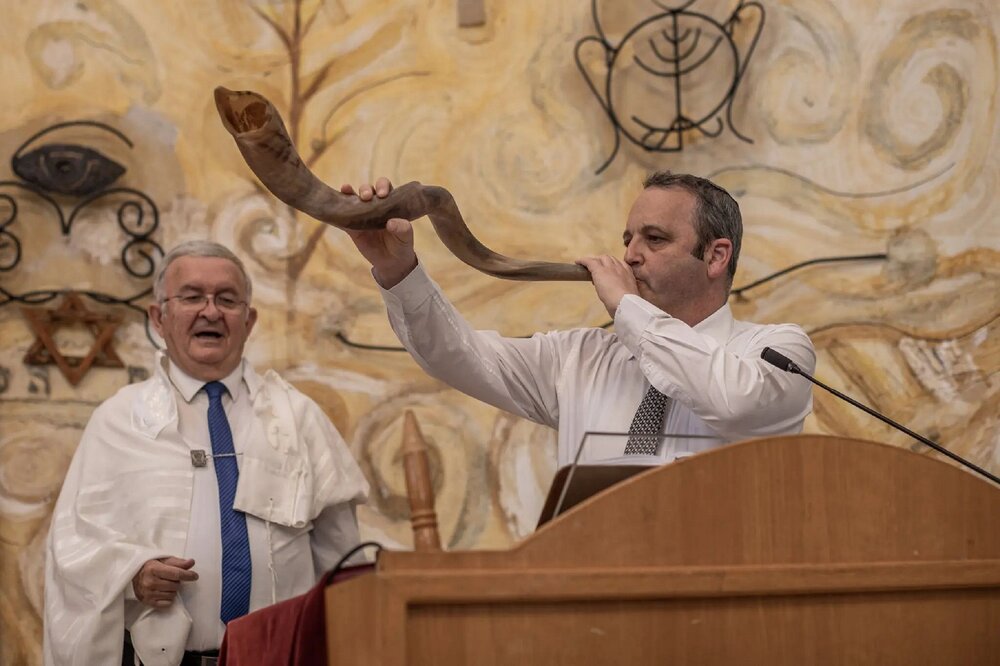Hawzah News Agency – When Gilad Kariv, an Israeli rabbi, heads to the Western Wall, one of the holiest places in Judaism, he often carries a Torah scroll that he hopes to give to a particular group of worshipers.
It’s harder than it sounds.
The worshipers are women, and therefore barred by Orthodox Jewish authorities from taking a Torah to the wall.
As a lawmaker with parliamentary immunity, Rabbi Kariv can bring them the Torah under police protection. But dozens of ultra-Orthodox opponents typically stand in his way to prevent the handover. They shout abuse and sometimes they try to rip the scroll from his hands.
The monthly effort highlights the imbalance between prayer rights for men and women at the wall, and foregrounds the contest over who gets to define Jewish practice in the Jewish state.
“It totally reflects the notion that there is more than one way to celebrate your Judaism,” Rabbi Kariv said in a recent interview. “We are here,” he added, “in order to crush this false thought that Judaism in Israel belongs to the right.”
Rabbi Kariv, 48, is at the heart of this battle. Elected to Parliament last March, he is the first rabbi from the more liberal Reform movement to serve as an Israeli lawmaker. That position has given him greater prominence in Israeli public life, creating a more visible alternative to the Orthodox authorities that have dominated Jewish life in Israel since its creation in 1948.
He campaigns to allow civil weddings and divorce, ending a system that requires Israeli Jews to begin and end marriages only under the auspices of the Orthodox-controlled body that has legal authority over religious affairs.
He also seeks equal access to government funding for synagogues of all Jewish denominations, which he says now goes disproportionately to Orthodox congregations. He wants to dramatically expand public transportation on the Jewish sabbath, a service unavailable in most of the country. And he has long fought for the government to ensure a place for men and women to pray together beside the Western Wall, a practice currently only possible a short distance away.
These desires have contributed to tensions within Israel’s fragile governing coalition. The coalition has not had a parliamentary majority since a right-wing member of the coalition, Idit Silman, resigned last month, partly in discomfort at causes promoted by Rabbi Kariv.
Ms. Silman said such measures contribute to “the erasure of Israel’s Jewish identity.”
But Rabbi Kariv says he is trying to do the opposite: to sustain Israel’s Jewish character by promoting a more pluralistic and inclusive vision of Judaism.
“His target audience is the secular people of Israel, not the Orthodox,” said Shlomit Ravitsky Tur-Paz, an expert on Jewish pluralism at the Israel Democracy Institute, a Jerusalem-based research group.
“The people who fight him think his reforms are going to change the Jewish identity of the state,” she added. “He’s saying: ‘No, I’m targeting secular people — to give them more Judaism in their life.’”
Rabbi Kariv’s path exemplifies the journey he hopes to encourage in others. He was born in Tel Aviv to a secular family that did not regularly attend synagogue.
His father was an economist and his mother a homemaker. They expressed their Jewishness through the endeavor of building a new Jewish state and reviving the Hebrew language, instead of through religious practice, Rabbi Kariv said.
“The first generations of non-Orthodox Israelis didn’t really feel the need for liberal expressions of Judaism, because they had the national expression of Judaism,” he said.
By contrast, Rabbi Kariv came of age in the 1980s — in an Israel that, while facing many challenges, no longer seemed quite so fragile. Searching for another layer of Jewish identity, he started to worship regularly at his local synagogue as a teenager.
By default, it was Orthodox.
Unlike in the United States, where the Reform movement is the most popular Jewish denomination, Orthodoxy is the dominant strain in Israel. Orthodox institutions had been granted a virtual monopoly over Israeli religious affairs since the state’s creation — partly as a concession to get them to go along with the Zionist project and partly because that was how Judaism had been administered under the Ottomans and British.
The Reform movement, Rabbi Kariv said, “wasn’t part of the vocabulary.”
Rabbi Kariv was introduced to other forms of Judaism as a 15-year-old on a trip organized by the Israel Boy and Girl Scouts Federation to Memphis, Tennessee.
Attending a Reform synagogue there, he was impressed that men and women could pray side by side, unlike in Orthodox synagogues, which are segregated by sex. And as the first intifada, or Palestinian uprising, raged back home, he was relieved to find a congregation that seemed closer to his center-left views on the Israeli-Palestinian conflict.
“This synagogue reflects my values in a deeper way,” he remembered thinking.
Back in Israel, he began attending a new Reform synagogue in Tel Aviv. After completing his military service in an intelligence unit, he said he felt a calling to devote his life to public service.
He began training simultaneously as a lawyer and a rabbi. He passed his bar exams in 2002 and was ordained a year later. He became a rabbi at Beit Daniel, a Reform synagogue in Tel Aviv, and helped lead an advocacy group promoting religious pluralism, work that often put his legal training into action.
He later headed the Reform movement in Israel for 12 years, hoping to expand it. On his first day as executive director in 2009, he said, he hung a map of Israel on his office wall and marked the cities without Reform synagogues. By the time he left the post in 2021, the number of Reform congregations had more than doubled.
His activism always had a political edge, but he realized that to advance his goal of a more pluralistic society he would need to enter electoral politics.
He ran for Parliament under the banner of Labor, the center-left party that once dominated Israeli politics but whose support has dwindled in recent years. After failing to win a seat in four elections, he won on his fifth try and entered Parliament last year.
The Reform movement is still marginal in Israel. Less than 10 percent of Israeli Jews identify as Reform. But a poll published in 2018 found that the number had more than doubled since 2013. The movement currently has more than 50 synagogues across the country.
As the standard-bearer for that shift, Rabbi Kariv has been the target of considerable abuse. On a recent visit to the Western Wall, ultra-Orthodox opponents mimed slitting his neck and shouted that Yitzhak Rabin, the Israeli prime minister who was assassinated in 1995, was “looking for a friend.”
Religious and right-wing lawmakers have long portrayed Rabbi Kariv as a heretic, with one accusing him of eating pork while wearing his kippa, and several saying they would not pray with him at the Parliament synagogue.
The animosity is not personal, said Gedalia Guttentag, news editor at Mishpacha, a Haredi magazine, but because of what the Reform movement represents. “Judaism is a big tent but positions that deny the divine origin of the Torah place him theologically outside the tent,” he said.
In reality, though, Rabbi Kariv has had little room to push for new legislation that would upset the religious right. The governing coalition is a fragile alliance of eight parties that have little in common. To avoid its collapse, each party has generally been forced to compromise on its biggest goals.
Rabbi Kariv has been unable to persuade colleagues to change the laws governing marriage and divorce or, for the time being, to implement a frozen government plan to expand the area for mixed prayer adjacent to the Western Wall. He even canceled plans to bring a Torah to the wall this month to avoid unduly roiling the coalition at such a delicate time.
For now at least, simply being in government is enough, he said: It keeps the ultra-Orthodox parties from power, preventing them from creating further obstacles to religious pluralism. If the religious right returns to power, he fears, it may seek to overturn a recent Supreme Court decision allowing people who convert to Reform Judaism in Israel to claim Israeli citizenship.
At his synagogue in Tel Aviv this month, about two dozen members of the congregation were completing their conversions to Reform Judaism, after a yearlong process. Some were Israelis from the former Soviet Union who qualified for citizenship through their Jewish ancestry but were not considered Jewish by the Orthodox authorities.
Rabbi Kariv beamed as the new converts sang and prayed together, while their relatives showered them with sweets.
“This is the reason why I’m in the Parliament,” he said. “We need to protect their ability to be part of Israeli society — and the Israeli Jewish community.”



Your Comment